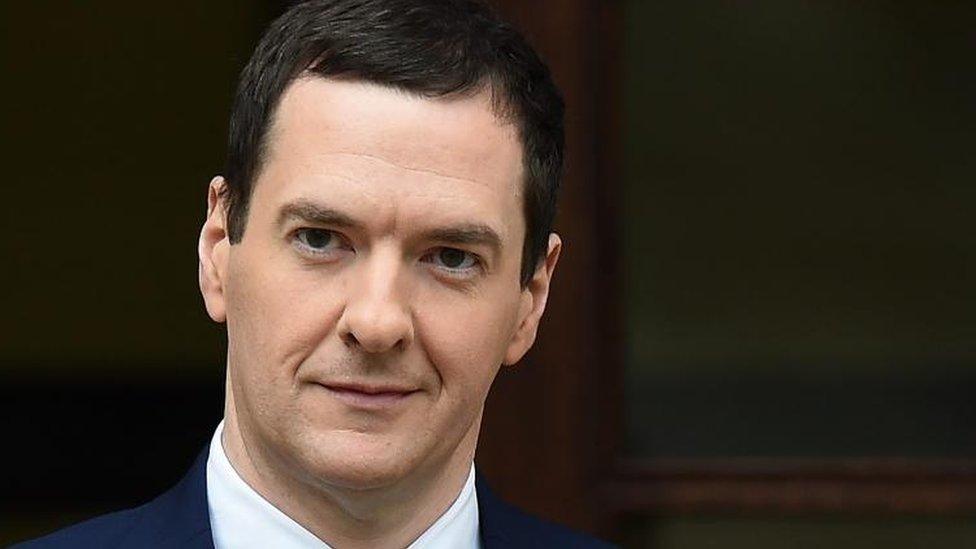Chancellor Osborne 'boxed-in' by policy pledges
- Published

Like Britain's fiendishly complicated tax code, the government's rule book for what it will or won't do when it comes to the tricky matter of running the UK economy is constantly lengthening.
Yesterday another was added to the list when Stephen Crabb, the new Work and Pensions Secretary, said that the government would not seek any further welfare cuts this Parliament.
Last Thursday, the Institute for Fiscal Studies (IFS) warned the Treasury that it had very little "wriggle room" if it was to hit its surplus target of £10.4bn by 2020 - a target many thought already pretty heroic in its assumptions.
That wriggle room has just become a little more cramped.
The welfare announcement takes its place alongside a pledge not to raise income tax, VAT or national insurance; a pledge not to cut the budgets of the NHS, schools, defence or overseas aid; a pledge to ensure pensions rise at the rate of inflation, earnings growth or 2.5%; and a pledge to increase the 40p higher tax threshold to £50,000 and the personal allowance before working people start paying income tax to £12,500 - both, in effect, a tax cut.
Mr Osborne also has his three fiscal rules - a yearly welfare spending ceiling (already breached); that debt as a percentage of national income will fall every year (already breached) and that the government will create a budget surplus by the end of the Parliament (the clock is ticking).
It is clear that on the spending side of the ledger, Mr Osborne's room for action is severely limited.
The Treasury has already announced £3.5bn of cuts to non-protected departments (which includes business and higher education, the home office and justice) to be achieved by 2020.
No details of where those cuts will fall have been revealed.
Fuel duty
Where else could Mr Osborne look, given his remarkable ability to find spritely rabbits down the back of the ever-forgiving Treasury sofa?
Though not a natural tax-increaser, the chancellor could look to raising the general tax burden.
Many, such as the IFS, have suggested a fuel duty rise as a relatively painless way of increasing government income given the precipitous fall in the oil price over the last 18 months and the consequent fall in the price of a litre of fuel.
That could add to the £27bn already brought in by taxes on petrol and diesel.
Mr Osborne has always fought shy of fuel duty rises, and other tax raising options may appear more palatable.
The Treasury could accelerate the increasing tax burden on large businesses, already facing an increased bill of £9bn by 2020 courtesy of a number of corporation tax changes all being conveniently "booked" in one year.
He could also look to move more of the spending burden onto local authorities, which have faced cuts in central government grants as a quid pro quo for the devolution of local tax raising powers.
With a small Parliamentary majority constantly under threat, the chancellor's allies know that increasing business taxes can be something of a free hit.
And local authority funding changes do not tend to spark marches on Westminster.
Of course, the economy could also take a turn for the better.
The Office for Budget Responsibility, the government's economic watchdog, was particularly gloomy on growth at the time of the Budget.
Its downward revision to 2.1% growth this year was more pessimistic than the Bank of England, which recently said that both productivity and wage growth were improving.
If there is an upturn, that could ease the tricky economic hand Mr Osborne is now playing.